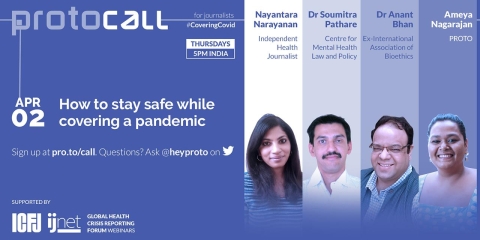PROTO, an Indian media development startup by ICFJ Knight Fellows Nasr ul Hadi and Ritvvij Parrikh, has launched PROTOcall — a series of weekly online webinars for Indian journalists on emerging issues in media and journalism around the COVID-19 crisis. The webinars are hosted by health journalist Nayantara Narayanan and PROTO’s community manager Ameya Nagarajan. Learn more about ICFJ's Global Health Crisis Reporting Forum.

India is currently in the midst of a 21-day nationwide lockdown ordered on March 24 by Prime Minister Narendra Modi. Journalists, who remain exempt from the lockdown, are on the frontlines covering the COVID-19 pandemic, sometimes with little or no gear to protect themselves from infection.
A panel of experts delved into how reporters can stay safe while covering the pandemic. Speakers included global health researcher Dr. Anant Bhan and Dr. Soumitra Pathare, a consultant psychiatrist and Director of Centre for Mental Health Law and Policy at the Indian Law Society.
Theja Ram, a Bangalore-based news reporter at The News Minute who joined the webinar for the first half, has been going out every day, covering stories in her area. When on duty, she walks on foot, moving between different neighborhoods. “One of the biggest problems that journalists without access to private vehicles face is that we have to walk or take public transportation...it’s not always possible not to come into contact with other people. “When I come back home, I have to douse my clothes in hot water and take a bath immediately.” Covering the pandemic has also impacted her mentally. She describes it as “the most stressful time I’ve had since covering the elections.”
Here are the main takeaways from the webinar on how to stay safe:
On the threat from droplet, contact and airborne transmissions
Bhan says the main and most worrying mode of transmission is droplet transmission, which occurs when someone who is infected coughs or sneezes, and the emerging respiratory droplets are inhaled by another person. “This kind of transmission is preventable by practicing physical distancing, and by taking simple steps like washing your hands frequently, and using sanitizer,” he said.
He explained contact transmission as occurring when a person touches a contaminated surface and then touches their face, mouth or eyes.
The less common airborne transmission occurs when respiratory droplets mix into the air and form micro droplets that remain in the air for a long time, potentially leading to infection if they are in a high enough quantity.
Bhan said: “There is a possibility that contact and airborne transmission could potentially spread infection. But I wouldn't worry about it, unless you find yourself in an environment such as the ICU or when constantly near someone who is seriously ill from COVID-19.”
In such cases, he said frequently disinfecting surfaces and precautions such as wearing masks and gloves can protect one from infection.
On whether journalists should wear masks
Bhan: “I think it's safe to say that we should be leaving masks, which are typically used in healthcare settings, such as surgical masks or N95 masks, to frontline healthcare personnel. Yet, we might want to be careful, especially if you're going into a more congested setting where there’s a high density of people. In such cases, you can use a routine mask, a scarf, or just any piece of cloth which can be tied around your face to cover your mouth and nose. There are now good guides available online on how to make masks at home.”
On dealing with the psychological impact of covering the crisis
Pathare: “Unlike floods or an earthquake, we don't know when or how this ends. Metaphorically speaking, it is important to approach the COVID-19 crisis as a marathon, not a sprint. That means changing your mindset with regards to how you approach your work, by not, for example, taking the decision to just go for it and get 20 stories in quickly because it's all going to be over soon.”
Pathare pointed out some of the warning signs that could indicate mental stress, including disturbed sleep patterns, a change in appetite, irritability or losing interest in your work.
“I would encourage all of you that if you are feeling even slightly stressed, talk to someone. That's probably your best way to stay well. And then again take all the usual precautions, if you can stay away from tobacco, drugs and alcohol, practice healthy habits such as exercise and eating well. These are standard things, and I think we sometimes don't recognize the importance of being physically healthy and the role that plays on being mentally healthy. If you're feeling physically well, then it's easier to feel mentally well.”
On how editors and newsroom supervisors can support journalists
Pathare: “I think the important thing to do is to provide much more active mentorship and professional supervision. And this can be by creating a buddy system within the newsroom, or bringing in someone from outside the organization who people can talk to without feeling like they will be judged negatively by their superiors as being inefficient or weak or anything of that sort.”
Pathare noted the importance of understanding the stress cycle in dealing with staff that might be under duress. “You need to know how people feel when they are stressed and the biology of stress, in order to set more realistic expectations. Very often editors tend to have very unrealistic expectations as any bosses have, and it creates more anger and frustration when those expectations are not met. All these factors need to be managed.
Watch the webinar here, read recaps of previous webinars here and sign up here to join the next PROTOcall.